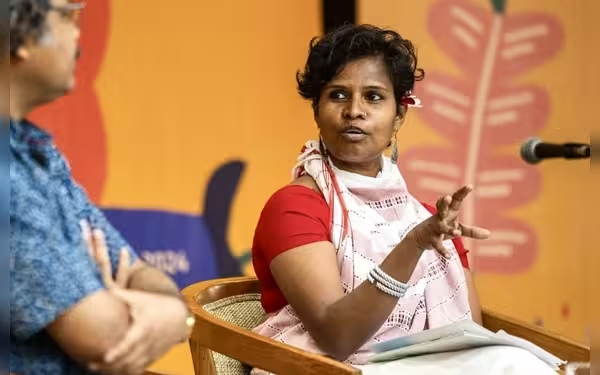Sunday, October 6, 2024 12:28 AM
Indian Poet Rejects US-Backed Award for Palestinian Children
- Jacinta Kerketta declines award for Palestinian solidarity.
- Award linked to USAID and Boeing raises concerns.
- Over 6,000 Palestinian women and 11,000 children killed.
 Image Credits: arabnewspk
Image Credits: arabnewspkIndian poet Jacinta Kerketta rejects a US-backed award to stand in solidarity with Palestinian children amid ongoing humanitarian crises.
In a significant act of solidarity, Indian poet Jacinta Kerketta has made headlines by rejecting a prestigious US-backed literary award. This decision comes in light of the ongoing humanitarian crisis in Gaza, where countless Palestinian children and women have lost their lives due to military actions supported by the United States. The award in question, the Room to Read Young Author Award, is co-sponsored by the US Agency for International Development (USAID) and Room to Read India Trust, an organization dedicated to promoting children's literacy.
Kerketta was set to receive this award for her latest children’s poetry collection titled “Jirhul.” However, upon learning about the award's affiliations, she felt compelled to prioritize the plight of Palestinian children over personal accolades. In her own words, she stated, “I declined this award because USAID is associated with Room to Read India Trust. When I got information about the award for children’s literature, I felt that it was more important to speak for the children of Palestine than to receive an award.”
Her concerns extend beyond the award itself. Kerketta highlighted the troubling connections between Room to Read India Trust and Boeing, a company known for its long-standing arms business with Israel. She expressed her dismay, saying, “At the same time when children were being killed in Palestine, Room to Read India Trust was collaborating with Boeing Company ... a company that has had arms business with Israel for a long time.” This statement underscores the complex web of relationships that can exist between humanitarian efforts and military interests.
Jacinta Kerketta, hailing from Jharkhand state in eastern India, belongs to the Adivasi community, which is one of India’s marginalized indigenous groups. She emphasized the struggles of her community, stating, “Adivasi people are struggling for their survival along with saving nature. They’re always an advocate of human freedom.” Her background and experiences have fueled her commitment to advocate for those who are oppressed, including the children and women of Palestine.
The situation in Gaza is dire, with reports indicating that more women and children have been killed by the Israeli military in the past year than in any other conflict over the last two decades. According to Oxfam, more than 6,000 Palestinian women and 11,000 children have lost their lives since October 2023, with many more unaccounted for. A study published earlier this year in The Lancet suggested that the true number of Palestinians killed could exceed 186,000 when considering indirect deaths from starvation, injury, and lack of medical aid.
Kerketta’s rejection of the award serves as a poignant reminder of the power of individual choices in the face of global injustices. It highlights the importance of standing in solidarity with those who are suffering, even when it means sacrificing personal recognition. In a world where humanitarian crises often go unnoticed, her actions encourage us to reflect on our own values and the impact of our decisions. As we navigate through these challenging times, it is crucial to remember that every voice matters, and every act of solidarity can contribute to a greater cause.













